Bob Dole Unplugged, Nine Yards, Paddy Wagon, The Skinny, Gauntlets, Greyhounds, Dick's Hatband, Pork Barrels, Ragamuffins, and Free Words for the Asking.
Take Your Hands Off Moi
Dear Evan: Someone just recently wrote a column about Senator Robert Dole's propensity to
refer to himself not as "I" or "me" but as "Bob Dole." There must be a name for someone who does
this. I am familiar with the editorial "we" -- which some wag said should only be used by royalty,
newspaper editors, or persons with parasitic infestation -- but didn't realize there might be a word that
describes one who refers to himself in the third person, or I suppose by his own name, as Dole does
continuously. Is his use of his own name the same as using the third person and does this qualify him
as an "illeist"? That word is hard to find except in the Oxford English Dictionary or Latin dictionaries
but describes one who makes much use of the pronoun "he," or writes of himself as "he." -- George
Bower, via the internet.
 I must admit that I haven't been paying as much attention to the presidential campaign as I
probably should have been, relying as I do for my current affairs updates on a combination of tea
leaves and conversations overheard on the subway. I do try to read the daily newspaper, of course, but
my parakeet gets in the way.
I must admit that I haven't been paying as much attention to the presidential campaign as I
probably should have been, relying as I do for my current affairs updates on a combination of tea
leaves and conversations overheard on the subway. I do try to read the daily newspaper, of course, but
my parakeet gets in the way.
In any case, I wasn't aware of Senator Dole's odd habit, possibly because I had become so used
to the Republican candidates referring to each other in the remote-as-possible third person that I
simply failed to notice that one of them was doing it to himself. As a name for someone who
habitually refers to him- or herself in the third person, "illeist" (from the Latin "ille," meaning "he" or
"that man") seems to fill the bill. Illeism, a term coined in the early 19th century, is usually considered
an affectation of bad writers, but I think we can safely include almost all politicians in that category.
It'll be interesting to see if that article you mention prompts Senator Dole's handlers to insist
that he knock it off. As a rhetorical device, this sort of thing works once or twice, but after a while you
begin to remind the voters of either Tarzan or Miss Piggy, neither of whom has a particularly good
track record at the polls.
Oh, You Mean "The Whole Nine YARNS"
Dear Evan: Recently, while in a boat shop, I was challenged to find the origin of the phrase
"The whole nine yards..." My challenger says this phrase is nautical in origin, having something to do
with yard arms on square-riggers. Sounds plausible, but I need more specifics! Your help would make
my day. -- Doug Pfaff, via the internet.
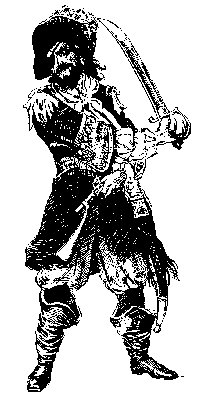 For all those loyal readers who have sent me variations on this question over the last few
months, I have good news and I have bad news. The good news is that I finally got Windows 95 to
work on my computer, though, for some curious reason, I still have to remove my shoes and hum
"Feelings" constantly while I type. The bad news is that the origin of "the whole nine yards," meaning
"the whole thing" or "everything," is, and probably will remain, an utter mystery. Nobody knows for
sure, and anyone who claims to is blowing smoke.
For all those loyal readers who have sent me variations on this question over the last few
months, I have good news and I have bad news. The good news is that I finally got Windows 95 to
work on my computer, though, for some curious reason, I still have to remove my shoes and hum
"Feelings" constantly while I type. The bad news is that the origin of "the whole nine yards," meaning
"the whole thing" or "everything," is, and probably will remain, an utter mystery. Nobody knows for
sure, and anyone who claims to is blowing smoke.
Still, the search for the origin of this phrase has been so energetic that it would be a shame not
to trot out a few of the more lively theories, so I've decided to devote this column and the next to this
topic.
The question, of course, is "nine yards of what?" Many things, it seems, involve more or less
nine yards of something, but none of the explanations I've heard involves precisely and invariably nine
yards of something common enough to explain the popularity of the phrase.
One theory, for example, holds that prisons were once built with a "no man's land" beyond the
wall, nine yards wide, that escapees had to cross before they made a clean getaway. While this may
have been true of a particular prison, it seems a shaky basis for so popular a term.
Tune in next time, when we'll look at some other theories about "the whole nine yards."
The Aforementioned Next Time
Last time out, we began an exploration of the various theories of the origins of "the whole nine
yards," meaning "all" or "the whole thing." The question that all these theories seek to answer is "nine
yards of what?" None of these theories is verifiable, but they're all fun to consider.
One of the most popular theories has it that nine square yards of fabric are needed to construct
a custom-made suit. Unfortunately, the average three-piece suit, it seems, consumes between 4 and 7
yards of fabric. A variation on the clothing theory holds that nine yards of material are the minimum
required to concoct a proper wedding dress, but even if true, this would seem more a coincidence than
a compelling explanation of the phrase.
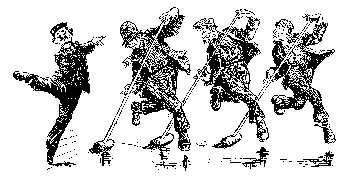
Another proposal is that the "yards" refers to the yardarms of sailing ships, and that a large
ship with all her sails set would be running "the whole nine yards." Yet another nautical theory holds
that the "yard" in question is a "yard of ale" -- a long, thin drinking glass. Newly promoted sailors in
the British Navy, it is said, were required by tradition to make the rounds of a certain nine pubs near
the London docks, drinking a "yard" of ale at each.
Taking to the air, another theory has it that fighter planes in World War Two carried nine
yards of ammunition belts in their machine guns, and thus a flier who had seen heavy action on a
mission was said to have used "the whole nine yards."
My favorite theory? Nine cubic yards, it is said, is roughly the capacity of a rotary cement-mixing
truck. To completely unload the contents of the truck, and thus finish the job, would be to go
"the whole nine yards." I am told that modern cement trucks hold somewhat more than nine cubic
yards of the stuff, but I still vote for this theory. It has the advantage of being very concrete.
Just Don't Get Me Started on "Welsh"
Dear Mr. Morris: Last Sunday afternoon, I heard a discussion on a radio talk show about the
use of the term "paddy wagon". The host insisted that the term is a terrible slam against the Irish. He
likened it to using "wop" against an Italian. A caller, who was Irish, disagreed, saying that the term
"paddy" came about because of the nickname for the policemen who were nicknamed after St. Patrick
and "wagon" just referred to the vehicle they used to pick up the people who were creating a
disturbance. Can you shed any enlightenment? -- Jo Kozlowski, via the internet.
Certainly. I shed enlightenment the way my cat sheds fur -- in great orange clumps. I've never
figured out, since we're on the subject (involuntarily, in your case), how cat fur ends up inside the
microwave. Does he make popcorn the minute I leave the house? Is he whipping up dinner for all his
pals while I'm gone? Is that where all the instant mashed potatoes went?
As far as your question goes, you have already heard the two likely answers, and no one
knows which is the truth. The use of "paddy wagon" as a slang term for a police van dates back to the
1920's, and seems to have originated in either New York City or Philadelphia, cities which had both
large Irish immigrant populations and largely Irish-American police forces during that period.
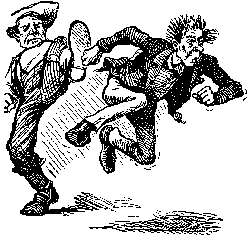 It is true that "Paddy," a familiar form of the common Irish name Padraic (or Patrick) was
used in the 19th and early 20th centuries as a generic, and often uncomplimentary, term for an
Irishman, both in the U.S. and England. But while "paddy" certainly was used as an insult in the past,
and Irish immigrants were without doubt the victims of discrimination, I think that it takes a pretty thin skin to
find a grave insult in the term "paddy wagon." Among other things, the fact that it remains unclear
whether the "paddy" involved was the arresting officer or the miscreant being arrested rather clouds
the logic of taking offense. That "paddy" is also used in non-pejorative contexts ("Saint Paddy's Day")
has also largely robbed the word of its sting, which is not the case with words such as "wop," which
have always been, and always will be, grave insults.
It is true that "Paddy," a familiar form of the common Irish name Padraic (or Patrick) was
used in the 19th and early 20th centuries as a generic, and often uncomplimentary, term for an
Irishman, both in the U.S. and England. But while "paddy" certainly was used as an insult in the past,
and Irish immigrants were without doubt the victims of discrimination, I think that it takes a pretty thin skin to
find a grave insult in the term "paddy wagon." Among other things, the fact that it remains unclear
whether the "paddy" involved was the arresting officer or the miscreant being arrested rather clouds
the logic of taking offense. That "paddy" is also used in non-pejorative contexts ("Saint Paddy's Day")
has also largely robbed the word of its sting, which is not the case with words such as "wop," which
have always been, and always will be, grave insults.
Skinny-dishing
Dear Evan: The other day I saw the latest Woody Allen movie and although I thought it was a
bit lame I did hear a phrase which fascinated me. The phrase was "I'll get the skinny on him for you"
meaning "I'll find out as much about him as I can, get the information on him...." Do you know
where this phrase came from? -- Brent Merrylees, via the internet.
No, and I wish I did, because readers ask about "the skinny" about once a year when it pops up
in a movie or television show. I'm beginning to think that there's one particular screenwriter in
Hollywood who has taken it as his or her special mission to keep this word alive.
"The skinny" does indeed mean "the straight story" or, more precisely, "the inside story, the
real truth." The first citation for this use of the word in the Oxford English Dictionary is remarkably
recent, from 1959. Since it appeared in the linguistics journal "American Speech" in that year,
however, we can safely assume that the term had been in circulation for quite a while before it was
reported. "The skinny" is defined as a slang term in the Third Edition of the American Heritage
Dictionary, but no clue is offered as to its origin.
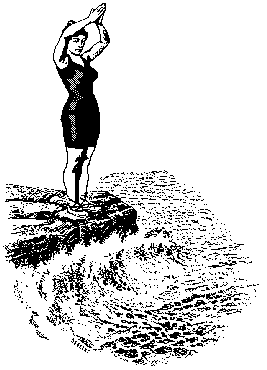 Related slang uses of the word "skinny" aren't much help. As of 1934, according to Eric
Partridge's Dictionary of the Underworld, "skinny" meant a ten-cent piece, probably related to the
classic "one thin dime." In Australian slang, a "skinny" is a young woman, and in the linguistic
outback of the world of high fashion, "skinny" means "tight-fitting." "Skinny-dipping," of course, is
the perennial youthful ritual of displaying your birthday suit under the guise of swimming. Finally,
according to Wentworth and Flexner's Dictionary of American Slang, if you happened to be a cadet at
Annapolis in the mid-1920's, "the skinny" meant a course in physics or astronomy. Go figure.
Related slang uses of the word "skinny" aren't much help. As of 1934, according to Eric
Partridge's Dictionary of the Underworld, "skinny" meant a ten-cent piece, probably related to the
classic "one thin dime." In Australian slang, a "skinny" is a young woman, and in the linguistic
outback of the world of high fashion, "skinny" means "tight-fitting." "Skinny-dipping," of course, is
the perennial youthful ritual of displaying your birthday suit under the guise of swimming. Finally,
according to Wentworth and Flexner's Dictionary of American Slang, if you happened to be a cadet at
Annapolis in the mid-1920's, "the skinny" meant a course in physics or astronomy. Go figure.
Ultimately, "the skinny" seems to be one of those slang phrases without a catchy story to
explain its origin. Most likely, it was a takeoff on the idea of "getting down to the skin" of a story,
beneath the flourishes and frippery.
Of Course, If It Doesn't Fit, the Duel's Off
Dear Evan: I was recently asked if I knew how to trace the origin of the phrase "throwing
down the gauntlet," as references to it do not appear in the encyclopedias or reference books already
searched. I (of course) piped up and said, "Well, I'm sure I can find something about that on the
Internet." Your page seemed an excellent place to start! -- Brent Negrete, Hayward, CA, via the
Internet.
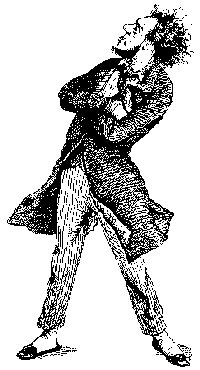 Aw, shucks. To "throw down the gauntlet," as I'm sure you know, means to challenge someone
else to a fight, and our modern use of the phrase is essentially identical to its original meaning. The
"gauntlet"
in the phrase is the heavy glove once worn by knights in armor (and comes from a diminutive form of
"gant," French for "glove"). A knight who threw his gauntlet down before another was issuing a
formal challenge to duel, which his opponent then accepted by picking up the gauntlet. While formal
duels are now a thing of the past (people seem to pretty much just up and shoot each other these days),
"throwing down the gauntlet" lives on in more metaphorically combative contexts, such as courtrooms
and proxy fights.
Aw, shucks. To "throw down the gauntlet," as I'm sure you know, means to challenge someone
else to a fight, and our modern use of the phrase is essentially identical to its original meaning. The
"gauntlet"
in the phrase is the heavy glove once worn by knights in armor (and comes from a diminutive form of
"gant," French for "glove"). A knight who threw his gauntlet down before another was issuing a
formal challenge to duel, which his opponent then accepted by picking up the gauntlet. While formal
duels are now a thing of the past (people seem to pretty much just up and shoot each other these days),
"throwing down the gauntlet" lives on in more metaphorically combative contexts, such as courtrooms
and proxy fights.
"Throwing down the gauntlet" is, incidentally, often confused with another phrase, "running
the gauntlet" (often spelled "gantlet"), but the two are unrelated. "Running the gauntlet" means to be
forced to run between two lines of opponents, who take the opportunity to inflict as much pain as they
can during the ordeal. The "gantlet" or "gauntlet" in this case is thought to be based on Swedish
words meaning "course," and to have originated during the Thirty Year's War in 17th century Europe.
Maybe It's Because the Rabbit Has Grey Hairs
Dear Evan: Recently I saw a TV news report on a group of people who rescue greyhounds
which have outlived their usefulness as racing dogs. These people find homes for the dogs, who would
otherwise be put to sleep. In watching the report, I noticed that these "greyhounds" were a variety of
colors, and wondered where they got their name -- was the breed originally all grey? -- L. Sanderson,
via the internet.
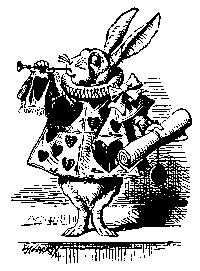 No, greyhounds are not necessarily grey, nor is there any reason that they should be. They
"grey" in their name isn't a color: it's the remnant of the Old Norse word "groy," meaning "female
dog." Of course, not all greyhounds are female; otherwise there would be remarkably few greyhounds
around to discuss. If the redundancy and illogic of the root meaning "female dog hound" seems odd,
it's just more evidence that the English language evolved, rather than being invented. Far more
conscious thought goes into the development of a breed like the greyhound than goes into developing
its name, which is largely a process of chance over hundreds or thousands of years.
No, greyhounds are not necessarily grey, nor is there any reason that they should be. They
"grey" in their name isn't a color: it's the remnant of the Old Norse word "groy," meaning "female
dog." Of course, not all greyhounds are female; otherwise there would be remarkably few greyhounds
around to discuss. If the redundancy and illogic of the root meaning "female dog hound" seems odd,
it's just more evidence that the English language evolved, rather than being invented. Far more
conscious thought goes into the development of a breed like the greyhound than goes into developing
its name, which is largely a process of chance over hundreds or thousands of years.
Speaking of "grey" (the color, not the dog), hundreds of years of argument still haven't quite
settled how to spell the word -- is it "grey" or "gray"? Although both spellings come from the same
Old English root, some writers and editors in 19th century England maintained that the two were
actually slightly different colors. "Grey" was considered slightly lighter and more delicate than "gray"
which was supposedly a "warmer" hue. Such distinctions lay only in the eye of the beholder, however,
because both "gray" and "grey" have always been defined as "the color intermediate between black
and white having no hue." Both forms are considered proper today, although "grey" is generally
preferred in Great Britain and "gray" has the upper hand in the U.S.
Uh, Mine's the Brown Fedora with the Chin Strap, Thanks
Dear Evan: My late father was in the habit of using certain expressions that repeatedly cropped
up in his conversation. In connection with unscrewing a rusty bolt, or with putting on a pair of
trousers that had not grown at the same rate as his waistline, or occasionally with reference to someone
who was reluctant to pay out money that he owed, Dad would say that the bolt, or the trousers, or the
person, was "as tight as Dick's hatband". Who was Dick, and why was his hatband so close-fitting? --
Wallace Riley, via the internet.
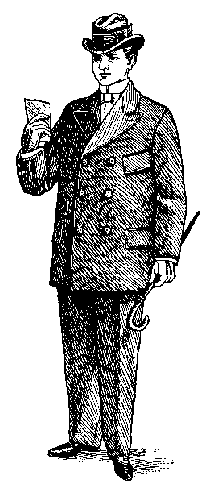 By virtue of the sort of eerie coincidence that characterizes this column, I have uncovered, just
yesterday, evidence of a nefarious plot among our nation's haberdashers. Upon returning from a
shopping trip, I discovered to my horror that the trousers I had purchased, while supposedly the same
size I have worn for years, did not fit. I'm no Einstein, but it seems clear to me that manufacturers
have decided to cut corners by making waistbands smaller. It's an outrage.
By virtue of the sort of eerie coincidence that characterizes this column, I have uncovered, just
yesterday, evidence of a nefarious plot among our nation's haberdashers. Upon returning from a
shopping trip, I discovered to my horror that the trousers I had purchased, while supposedly the same
size I have worn for years, did not fit. I'm no Einstein, but it seems clear to me that manufacturers
have decided to cut corners by making waistbands smaller. It's an outrage.
You don't say where you grew up, but I'd hazard a guess that it was somewhere in the South,
for "tight as Dick's hatband" is primarily a Southern expression here in the U.S. I say "here in the
U.S." because, according to Robert Hendrickson's "Whistling Dixie, A Dictionary of Southern
Expressions" (Pocket Books, $12.95), the phrase actually originated in Great Britain. The "Dick" in
question was probably Oliver Cromwell's son Richard (1626-1712), who succeeded his father as ruler
of England. Richard's brief reign, a matter of only seven months ending in his abdication, made him
the object of popular contempt and the butt of many jokes. The unfortunate Dick's "hatband" was his
crown, and the "tightness" was the discomfort and apprehension he was presumed to have felt.
Variants on the joke at the time included another phrase sometimes still heard, "queer as Dick's
hatband," referring to the preposterous course of Richard's reign.
"Tight as Dick's hatband" made the leap across the Atlantic and took up residence in the
American South, where, the Cromwell saga being largely unknown, it was taken as a folk expression
denoting extreme tightness or, sometimes, stinginess. And now, if you'll excuse me, I have to return
something to the store.
Very Cute. Now Get Back in the Barrel.
Dear Evan: News about our government on any given day usually has at least one story
about "pork-barreling" or just "pork." Despite everyone's desire to reduce or eliminate it, it still
continues and probably will be a fixture of our legislators forever more. I know that it refers to
patronage appointments by politicians, or the procuring of lucrative contracts for their home districts,
but I'm confounded as to the origin of this term. I don't even know what a "pork-barrel" is! Any
suggestions, since my previously trusty Webster's 9th has let me down? -- Tae, via the internet.
 Apropos of pork, your question leads me to wonder how the movie "Babe," recipient of so
many recent accolades, has affected pork consumption in this country. I can just imagine how the
pork industry, which has spent the last few years strenuously touting pork as "the other white meat,"
feels about a hit movie starring a cute pig. Most children would probably sooner eat Lassie chops or
roasted Muppets than pork at this point.
Apropos of pork, your question leads me to wonder how the movie "Babe," recipient of so
many recent accolades, has affected pork consumption in this country. I can just imagine how the
pork industry, which has spent the last few years strenuously touting pork as "the other white meat,"
feels about a hit movie starring a cute pig. Most children would probably sooner eat Lassie chops or
roasted Muppets than pork at this point.
A "pork barrel" is, or was, just what it sounds like -- a barrel full of pork, commonly found in
rural American kitchens in the 19th century. While a barrel of meat may seem a dubious food-storage
choice to us today, the amount of pork to be found in a family's barrel was considered a reliable index
of their prosperity. James Fenimore Cooper, writing in 1845, noted that "I hold a family to be in a
desperate way, when the mother can see the bottom of the pork barrel."
Pork, in fact, played so central a role in 19th century rural life that the word was generally
used as a synonym for wealth, and, in particular, wealth derived from political graft and corruption. It
wasn't that great a leap, therefore, to apply the image of a pork barrel to legislation aimed at
benefitting a politician's own constituents (either figuratively or literally filling their "pork barrels") and thus ensuring his
re-election.
Then Again, Maybe She Meant that You Reminded Her of a 14th Century Monster
Dear Evan: Years ago, my grandmother used to refer to me as "that little ragamuffin" and
although I thought knew what she meant, I never got around to finding out what the word really
meant.. So tell me, what's a "ragamuffin," and should I have been offended? -- Daniel Wheeler,
Detroit, MI.
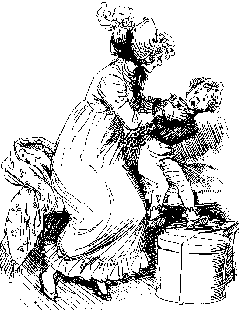 Well, if this exchange with your grandmother took place within the last 400 years or so, you
have nothing to worry about. "Ragamuffin" today is used most often to describe a rambunctious,
scruffy child, probably a boy, probably quite dirty, who reduces his clothes to tatters and his parents to
dismay on a daily basis. Dennis the Menace is our national ragamuffin, with Tom Sawyer and Huck
Finn his forebears. The word is more affectionate than "tatterdemalion" and carries none of the
desperate implications of "urchin," a child of the streets. All today's "ragamuffin" really needs is a
bath.
Well, if this exchange with your grandmother took place within the last 400 years or so, you
have nothing to worry about. "Ragamuffin" today is used most often to describe a rambunctious,
scruffy child, probably a boy, probably quite dirty, who reduces his clothes to tatters and his parents to
dismay on a daily basis. Dennis the Menace is our national ragamuffin, with Tom Sawyer and Huck
Finn his forebears. The word is more affectionate than "tatterdemalion" and carries none of the
desperate implications of "urchin," a child of the streets. All today's "ragamuffin" really needs is a
bath.
The original "ragamuffin," however, would have needed much more than a bath. He made his
debut in William Langland's "Piers Plowman," written in 1393 and considered perhaps the greatest
medieval English poem. "Piers Plowman" is an allegorical epic where characters represent, and are
often named for, moral abstractions (with characters named Truth, Wisdom and Will, for instance).
But "Ragamoffyn," as Langland spelled it, did not symbolize a cute child -- Ragamoffyn was a demon,
a fiend, a devil. Where Langland got the name is unknown, but it seems to be a combination of
"ragged" and "ffyn" (which may be a corruption of "fiend"). Medieval writers often gave their
demonic characters fanciful and deceptively playful names, and the "ragged fiend" Ragamoffyn was
far from cuddly.
By the late 16th century, however, Ragamoffyn had been de-fanged in popular usage and
"ragamuffin" was used to mean "a dirty or disreputable man or boy." Two hundred years later,
Dickens used the word in "Barnaby Rudge" in today's sense -- a ragged, scruffy little boy, impish but
not demonic.
Oh Look, It's a Tiny Silk Purse!
If I were to indulge in a bit of self-analysis (and why not -- my rates are the lowest in town), I'd
be forced to admit that much of what I've written about the Internet in this column has had a slightly
ambivalent ring to it. Although I've been "on the net" for years, I still can't seem to shake the gnawing
suspicion that the whole thing is, ultimately, just another (albeit very slow) version of
television. Still, hope springs eternal, and is occasionally rewarded by the discovery of something
available on the internet that, while it may not completely make up for the vapidity of much of what
you'll find online, is inarguably nifty.
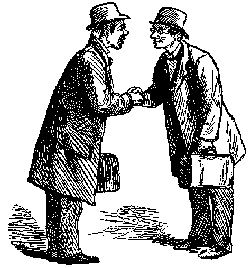 One such recent discovery is an e-mail mailing list called "The Word of the Day." For the
benefit of the uninitiated, an e-mail mailing list is an automatic program that sends you a different
e-mail message every day or so. There are thousands of mailing lists on the internet on almost as
many topics, almost all of them offering free subscriptions. The "Word of the Day" list, created in
1994 by a fellow named Anu Garg, now boasts more than 36,000 subscribers, and owes much of its
success to its simple premise. Every day, like clockwork, subscribers open their e-mail mailboxes to
discover an unusual word, complete with definition, pronunciation, origin, and even a sample sentence
illustrating proper use of the word.
One such recent discovery is an e-mail mailing list called "The Word of the Day." For the
benefit of the uninitiated, an e-mail mailing list is an automatic program that sends you a different
e-mail message every day or so. There are thousands of mailing lists on the internet on almost as
many topics, almost all of them offering free subscriptions. The "Word of the Day" list, created in
1994 by a fellow named Anu Garg, now boasts more than 36,000 subscribers, and owes much of its
success to its simple premise. Every day, like clockwork, subscribers open their e-mail mailboxes to
discover an unusual word, complete with definition, pronunciation, origin, and even a sample sentence
illustrating proper use of the word.
What makes Mr. Garg's list remarkable, and remarkably entertaining, are the words -- I don't
know how he picks them, but he manages to find some truly fascinating ones. In the last week, The
Word of the Day has treated its readers to "farouche" (meaning "wild" or "shy"), "mulct" (meaning "to
fine" or "to swindle"), and "pleonasm" (redundancy, illustrated by Ambrose Bierce's definition: "An
army of words escorting a corporal of thought").
To subscribe to The Word of the Day, just send an e-mail message to wsmith@wordsmith.org,
and on the subject line of your message put "subscribe John Smith," substituting your own name, of
course.
Back to main page
 I must admit that I haven't been paying as much attention to the presidential campaign as I
probably should have been, relying as I do for my current affairs updates on a combination of tea
leaves and conversations overheard on the subway. I do try to read the daily newspaper, of course, but
my parakeet gets in the way.
I must admit that I haven't been paying as much attention to the presidential campaign as I
probably should have been, relying as I do for my current affairs updates on a combination of tea
leaves and conversations overheard on the subway. I do try to read the daily newspaper, of course, but
my parakeet gets in the way. For all those loyal readers who have sent me variations on this question over the last few
months, I have good news and I have bad news. The good news is that I finally got Windows 95 to
work on my computer, though, for some curious reason, I still have to remove my shoes and hum
"Feelings" constantly while I type. The bad news is that the origin of "the whole nine yards," meaning
"the whole thing" or "everything," is, and probably will remain, an utter mystery. Nobody knows for
sure, and anyone who claims to is blowing smoke.
For all those loyal readers who have sent me variations on this question over the last few
months, I have good news and I have bad news. The good news is that I finally got Windows 95 to
work on my computer, though, for some curious reason, I still have to remove my shoes and hum
"Feelings" constantly while I type. The bad news is that the origin of "the whole nine yards," meaning
"the whole thing" or "everything," is, and probably will remain, an utter mystery. Nobody knows for
sure, and anyone who claims to is blowing smoke.
 It is true that "Paddy," a familiar form of the common Irish name Padraic (or Patrick) was
used in the 19th and early 20th centuries as a generic, and often uncomplimentary, term for an
Irishman, both in the U.S. and England. But while "paddy" certainly was used as an insult in the past,
and Irish immigrants were without doubt the victims of discrimination, I think that it takes a pretty thin skin to
find a grave insult in the term "paddy wagon." Among other things, the fact that it remains unclear
whether the "paddy" involved was the arresting officer or the miscreant being arrested rather clouds
the logic of taking offense. That "paddy" is also used in non-pejorative contexts ("Saint Paddy's Day")
has also largely robbed the word of its sting, which is not the case with words such as "wop," which
have always been, and always will be, grave insults.
It is true that "Paddy," a familiar form of the common Irish name Padraic (or Patrick) was
used in the 19th and early 20th centuries as a generic, and often uncomplimentary, term for an
Irishman, both in the U.S. and England. But while "paddy" certainly was used as an insult in the past,
and Irish immigrants were without doubt the victims of discrimination, I think that it takes a pretty thin skin to
find a grave insult in the term "paddy wagon." Among other things, the fact that it remains unclear
whether the "paddy" involved was the arresting officer or the miscreant being arrested rather clouds
the logic of taking offense. That "paddy" is also used in non-pejorative contexts ("Saint Paddy's Day")
has also largely robbed the word of its sting, which is not the case with words such as "wop," which
have always been, and always will be, grave insults.
 Related slang uses of the word "skinny" aren't much help. As of 1934, according to Eric
Partridge's Dictionary of the Underworld, "skinny" meant a ten-cent piece, probably related to the
classic "one thin dime." In Australian slang, a "skinny" is a young woman, and in the linguistic
outback of the world of high fashion, "skinny" means "tight-fitting." "Skinny-dipping," of course, is
the perennial youthful ritual of displaying your birthday suit under the guise of swimming. Finally,
according to Wentworth and Flexner's Dictionary of American Slang, if you happened to be a cadet at
Annapolis in the mid-1920's, "the skinny" meant a course in physics or astronomy. Go figure.
Related slang uses of the word "skinny" aren't much help. As of 1934, according to Eric
Partridge's Dictionary of the Underworld, "skinny" meant a ten-cent piece, probably related to the
classic "one thin dime." In Australian slang, a "skinny" is a young woman, and in the linguistic
outback of the world of high fashion, "skinny" means "tight-fitting." "Skinny-dipping," of course, is
the perennial youthful ritual of displaying your birthday suit under the guise of swimming. Finally,
according to Wentworth and Flexner's Dictionary of American Slang, if you happened to be a cadet at
Annapolis in the mid-1920's, "the skinny" meant a course in physics or astronomy. Go figure. Aw, shucks. To "throw down the gauntlet," as I'm sure you know, means to challenge someone
else to a fight, and our modern use of the phrase is essentially identical to its original meaning. The
"gauntlet"
in the phrase is the heavy glove once worn by knights in armor (and comes from a diminutive form of
"gant," French for "glove"). A knight who threw his gauntlet down before another was issuing a
formal challenge to duel, which his opponent then accepted by picking up the gauntlet. While formal
duels are now a thing of the past (people seem to pretty much just up and shoot each other these days),
"throwing down the gauntlet" lives on in more metaphorically combative contexts, such as courtrooms
and proxy fights.
Aw, shucks. To "throw down the gauntlet," as I'm sure you know, means to challenge someone
else to a fight, and our modern use of the phrase is essentially identical to its original meaning. The
"gauntlet"
in the phrase is the heavy glove once worn by knights in armor (and comes from a diminutive form of
"gant," French for "glove"). A knight who threw his gauntlet down before another was issuing a
formal challenge to duel, which his opponent then accepted by picking up the gauntlet. While formal
duels are now a thing of the past (people seem to pretty much just up and shoot each other these days),
"throwing down the gauntlet" lives on in more metaphorically combative contexts, such as courtrooms
and proxy fights. No, greyhounds are not necessarily grey, nor is there any reason that they should be. They
"grey" in their name isn't a color: it's the remnant of the Old Norse word "groy," meaning "female
dog." Of course, not all greyhounds are female; otherwise there would be remarkably few greyhounds
around to discuss. If the redundancy and illogic of the root meaning "female dog hound" seems odd,
it's just more evidence that the English language evolved, rather than being invented. Far more
conscious thought goes into the development of a breed like the greyhound than goes into developing
its name, which is largely a process of chance over hundreds or thousands of years.
No, greyhounds are not necessarily grey, nor is there any reason that they should be. They
"grey" in their name isn't a color: it's the remnant of the Old Norse word "groy," meaning "female
dog." Of course, not all greyhounds are female; otherwise there would be remarkably few greyhounds
around to discuss. If the redundancy and illogic of the root meaning "female dog hound" seems odd,
it's just more evidence that the English language evolved, rather than being invented. Far more
conscious thought goes into the development of a breed like the greyhound than goes into developing
its name, which is largely a process of chance over hundreds or thousands of years. By virtue of the sort of eerie coincidence that characterizes this column, I have uncovered, just
yesterday, evidence of a nefarious plot among our nation's haberdashers. Upon returning from a
shopping trip, I discovered to my horror that the trousers I had purchased, while supposedly the same
size I have worn for years, did not fit. I'm no Einstein, but it seems clear to me that manufacturers
have decided to cut corners by making waistbands smaller. It's an outrage.
By virtue of the sort of eerie coincidence that characterizes this column, I have uncovered, just
yesterday, evidence of a nefarious plot among our nation's haberdashers. Upon returning from a
shopping trip, I discovered to my horror that the trousers I had purchased, while supposedly the same
size I have worn for years, did not fit. I'm no Einstein, but it seems clear to me that manufacturers
have decided to cut corners by making waistbands smaller. It's an outrage. Apropos of pork, your question leads me to wonder how the movie "Babe," recipient of so
many recent accolades, has affected pork consumption in this country. I can just imagine how the
pork industry, which has spent the last few years strenuously touting pork as "the other white meat,"
feels about a hit movie starring a cute pig. Most children would probably sooner eat Lassie chops or
roasted Muppets than pork at this point.
Apropos of pork, your question leads me to wonder how the movie "Babe," recipient of so
many recent accolades, has affected pork consumption in this country. I can just imagine how the
pork industry, which has spent the last few years strenuously touting pork as "the other white meat,"
feels about a hit movie starring a cute pig. Most children would probably sooner eat Lassie chops or
roasted Muppets than pork at this point. Well, if this exchange with your grandmother took place within the last 400 years or so, you
have nothing to worry about. "Ragamuffin" today is used most often to describe a rambunctious,
scruffy child, probably a boy, probably quite dirty, who reduces his clothes to tatters and his parents to
dismay on a daily basis. Dennis the Menace is our national ragamuffin, with Tom Sawyer and Huck
Finn his forebears. The word is more affectionate than "tatterdemalion" and carries none of the
desperate implications of "urchin," a child of the streets. All today's "ragamuffin" really needs is a
bath.
Well, if this exchange with your grandmother took place within the last 400 years or so, you
have nothing to worry about. "Ragamuffin" today is used most often to describe a rambunctious,
scruffy child, probably a boy, probably quite dirty, who reduces his clothes to tatters and his parents to
dismay on a daily basis. Dennis the Menace is our national ragamuffin, with Tom Sawyer and Huck
Finn his forebears. The word is more affectionate than "tatterdemalion" and carries none of the
desperate implications of "urchin," a child of the streets. All today's "ragamuffin" really needs is a
bath. One such recent discovery is an e-mail mailing list called "The Word of the Day." For the
benefit of the uninitiated, an e-mail mailing list is an automatic program that sends you a different
e-mail message every day or so. There are thousands of mailing lists on the internet on almost as
many topics, almost all of them offering free subscriptions. The "Word of the Day" list, created in
1994 by a fellow named Anu Garg, now boasts more than 36,000 subscribers, and owes much of its
success to its simple premise. Every day, like clockwork, subscribers open their e-mail mailboxes to
discover an unusual word, complete with definition, pronunciation, origin, and even a sample sentence
illustrating proper use of the word.
One such recent discovery is an e-mail mailing list called "The Word of the Day." For the
benefit of the uninitiated, an e-mail mailing list is an automatic program that sends you a different
e-mail message every day or so. There are thousands of mailing lists on the internet on almost as
many topics, almost all of them offering free subscriptions. The "Word of the Day" list, created in
1994 by a fellow named Anu Garg, now boasts more than 36,000 subscribers, and owes much of its
success to its simple premise. Every day, like clockwork, subscribers open their e-mail mailboxes to
discover an unusual word, complete with definition, pronunciation, origin, and even a sample sentence
illustrating proper use of the word.